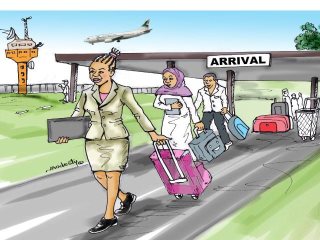Pathway to the Homeland
It is the dream of every African in the diaspora to be given the right and privileges just like citizens in other countries. So far, Ghana is the first country that willingly accepted Africans in the diaspora and was given the right to freedom.
Decades ago, when the United Nations stripped Africans of their integrity and honour, it subdued to unending toil and anguish. Africans embarked on a journey of no return far away from their homelands.
Envision
• That United Nations saw them as first-class citizens. That they help Africans in the diaspora trace back their roots by conducting DNA tests. Getting accepted by their families in a place they call home- finally free from racism and discrimination.
• That the United Nations protect their human rights and respect for the diasporas. And this development be officially approved and remembered as a sign of freedom for all Africans in the diaspora
• Also, that African diasporas be given equal right to abode; just like in Ghana where all diasporas are given a temporal pass or permitted, the right to settle in Ghana. They provide a connection between the government and the diasporas to facilitate developing and investing in the country. Currently, Africans in diaspora only operate on a temporal pass, residency/work permit until both Association (Ghana Caribbean and African-American Association) says otherwise.
• That a day comes when returnees (African diaspora) feel at home. They are brothers and sisters and should be treated as such. They should be given the “right to abode” in any African country because ” they share a common interest,”… according to the director of research at Ghana interior ministry, Samuel Amankwah.
• That someday the United Nations will collaborate with other African countries to raise funds for the diaspora that give better lives: creating jobs, building facilities, and health care centers for regular treatments and checkups.
• And also that the United Nations implement a mandatory course for Africans in the diaspora. To lecture them on the cultural practice of various countries before relocating or resettling.
• That someday Africans in various countries will be given citizenship, especially those who want to relocate. Citizenship should be granted in countries where they (Africans in Diaspora) can easily blend in with their culture in one way or another.
For example, diasporan Brazilians would do rather well in Angola or Cape Verde since Portuguese is the common language among theree countries, while diasporan francophones and Haitians would feel most comfortable in Ivory Coast or Cameroon, not to mention African North-Americans and Caribbean diasporans who would be more likely than not do well in Nigeria, Ghana, Sierra Leone, Liberia or the Gambia since the English language is prevalent in these countries, and let us not forget our Spanish speaking diasporan brothers and sisters in Cuba, Puerto Rico, Venezuela and Columbia who share a common language with the African country Republic of Equatorial Guinea, get the picture?
• I see the United Nations giving all Africans citizenship in their country of birth. This will give them the right to come back anytime they please to see their loved ones.
• That the United Nations works hand in hand with other African countries to set up an agency that will handle the affairs of all diasporas relocating to Africa.
Final Thought
Africans in the diaspora can play a considerable role when relocated to Africa. They are the perfect tool for innovations and development in the continent. If the United Nations drop the perception they have of Africans and come to terms with the fact that they deserve more than what has been dished out to them so far, the world would be a better place.
The first step to help the diaspora will be creating social entrepreneurship investment in the country, such as institutions, industries, companies in Africa. It will create jobs for Africans in the diaspora relocating to Africa, thereby boosting the African economy.


